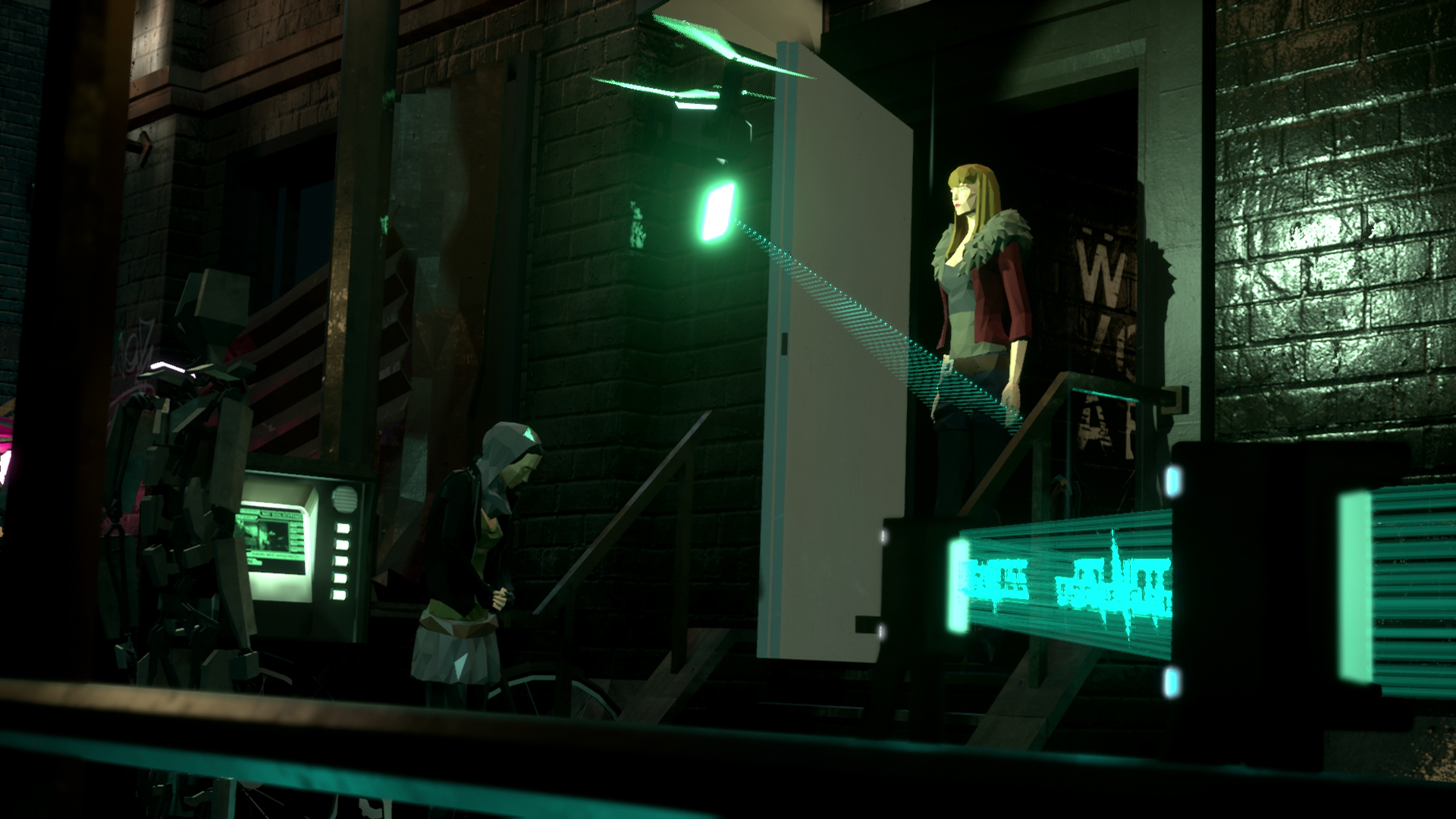Platforms:
Xbox One, PS4, PC, Nintendo Switch
Released:
August 15, 2018
Publisher:
Daedalic Entertainment
Developer:
Daedalic Entertainment
Does a game need gameplay? I found myself asking this question as I played through German developer Daedalic’s State of Mind. State of Mind is a unique narrative-driven cyberpunk experience that leans a lot harder on its story and characters than its interactivity. It is a memorable tale about family, nestled in a larger narrative about artificial intelligence and transhumanism. However the way it is presented may not be everyone’s cup of tea.
State of Mind’s story largely follows Richard Nolan, a journalist in 2048 Berlin. Richard’s wife and son have disappeared after he awoke from a car accident. Whilst Richard searches for his family, we’re also introduced to Adam Newman, another journalist in a virtual paradise called City5. Eventually, both men end up in the centre of a sinister conspiracy involving brain uploading and artificial intelligence. The English voice cast is mostly excellent, with Doug Cockle (who also played Geralt of Rivia in the Witcher video games) bringing a grizzled determination to the character of Richard.
“The dark and realistic future Berlin is contrasted strikingly with the more vibrant and abstract City5.”
A unique aspect of State of Mind is the visual presentation. The setting has a deliberately jagged and low-poly look to it, with the characters themselves looking as though they are made of origami. It took me some time to adjust to the strange-looking characters, but it definitely grew on me. The game’s overall visual direction is very strong. The dark and realistic future Berlin is contrasted strikingly with the more vibrant and abstract City5.
Another aspect of the game’s fiction is how the characters have artificial reality implants, allowing them to see holographic messages. This means that most objects can be scanned and show descriptions in a holographic pop-up. It was a clever little way to flesh out the setting without having the characters inorganically talk to themselves to describe things around them.

The visuals and voice acting also made it easier to forgive the somewhat stiff and awkward character models.
The game boasts some action-packed cutscenes. However, most of the dialogue scenes involve two characters standing still whilst talking, and occasionally moving their hands around a bit. It rarely comes across as particularly natural, especially considering how much of the game involves watching two or more characters talking.
“The problem isn’t that there is a lot of dialogue, but rather that so little of it is actually impacted by the player.”
Now we’re somewhat approaching the root of the issue, in that State of Mind is a rather passive experience. The problem isn’t that there is a lot of dialogue, but rather that so little of it is actually impacted by the player.
The game does occasionally ask the player to decide how Richard or Adam responds to something. However, it rarely changes anything outside of that specific scene.
You never have to worry about what characters think of you, or how your choices will impact future events. The game does eventually give you choices with story-altering consequences, but only in the last chapter or so. Thus, for most of the game, it felt as though I was watching a lot more than I was playing.
The main reason it bothers me is how I feel it could have improved the experience. Other games, like the Deus Ex series and the recently released Detroit: Become Human, explore similar themes. However, unlike State of Mind, they allow the player to express opinions on transhumanism and technology through in-game actions, and maintain a sense of engagement when those actions have consequences.
Richard does not come across as particularly concerned about most of the events occurring, except for how they impact his missing family. He and Adam do eventually get to help decide the course of world-altering technology. However, it would have been better to have placed more of those consequential choices throughout the game.
Furthermore, this means that the game lacks replay value compared with other narrative-based games. The story will play out much the same way every playthrough, so there may not be much incentive to return.
The plot is occasionally paused to give the player puzzles to complete. These can involve piecing together a scene, assembling pieces of evidence, or flying a drone around to scan things. Whilst I appreciated these chances to be more involved in the game, they were generally quite simple and brief.
The game ramps up the variety in the puzzles in the last chapter, with more complex challenges. I wish the rest of the game had leaned harder on those kinds of puzzles, as it was where I felt the struggle that the characters were undergoing.
I liked how the story always maintains a personal focus. State of Mind deals with some heavy technological themes, involving transhumanism, virtual reality and the fate of humanity itself. That said, it never distracts from Richard’s personal quest to save his family and redeem himself as a father and husband.
Some may have liked more of a focus on the technological aspects of the setting. However, I felt that focusing the story around Richard’s struggle for his family gave the story some necessary personal stakes.
Positive:
- Unique and striking visual design
- Interesting cyberpunk premise and themes
- Solid performances
Negative:
- Character models can be limited and stiff
- Overall lack of interactivity
- Lack of replay value
State of Mind certainly tells an interesting story, and I would be interested in diving into that world again. However, after playing through the roughly 15-hour game, I don’t really know if it can be recommended on the strength of its interactivity.
State of Mind’s plot is certainly engrossing, particularly as the stakes ramp up in the latter chapters. However, if you prefer narrative-based games to be more centred around player decisions, State of Mind may not be for you.














